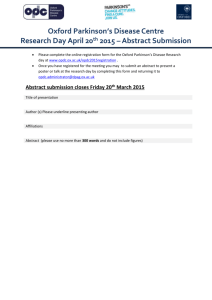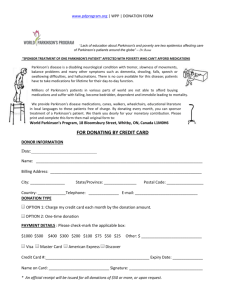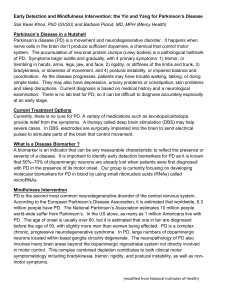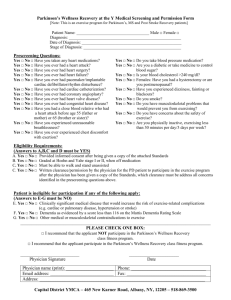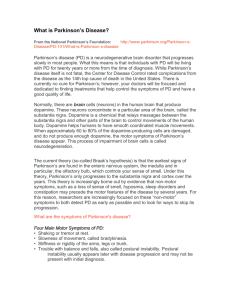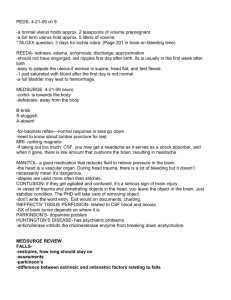Skin and sweating problems in Parkinson`s
advertisement
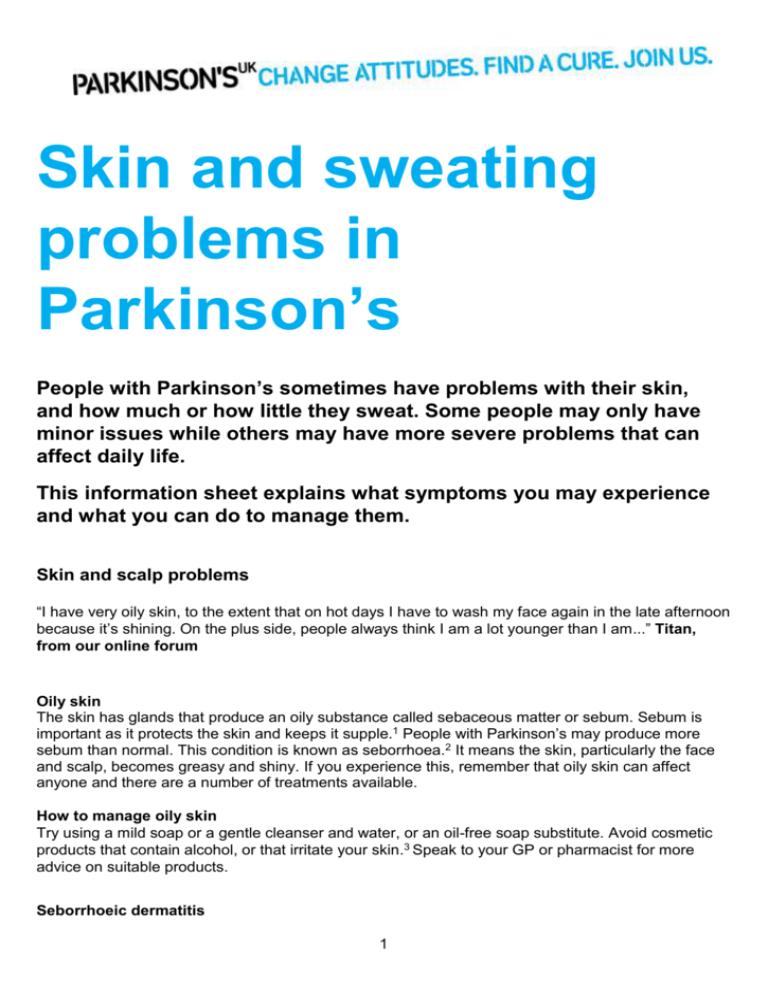
Skin and sweating problems in Parkinson’s People with Parkinson’s sometimes have problems with their skin, and how much or how little they sweat. Some people may only have minor issues while others may have more severe problems that can affect daily life. This information sheet explains what symptoms you may experience and what you can do to manage them. Skin and scalp problems “I have very oily skin, to the extent that on hot days I have to wash my face again in the late afternoon because it’s shining. On the plus side, people always think I am a lot younger than I am...” Titan, from our online forum Oily skin The skin has glands that produce an oily substance called sebaceous matter or sebum. Sebum is important as it protects the skin and keeps it supple.1 People with Parkinson’s may produce more sebum than normal. This condition is known as seborrhoea.2 It means the skin, particularly the face and scalp, becomes greasy and shiny. If you experience this, remember that oily skin can affect anyone and there are a number of treatments available. How to manage oily skin Try using a mild soap or a gentle cleanser and water, or an oil-free soap substitute. Avoid cosmetic products that contain alcohol, or that irritate your skin.3 Speak to your GP or pharmacist for more advice on suitable products. Seborrhoeic dermatitis 1 This is a condition where areas of the skin that have lots of sebaceous glands become red, itchy and sore.4 The skin also peels and flakes, and may develop thick crusts or scales. 4 Seborrhoeic dermatitis is a common problem, although people with Parkinson’s are likely to develop it.5 The main areas affected include:6 the scalp – in mild cases skin can flake off as dandruff. In more severe cases, people may have a red, scaly scalp, sometimes with a weeping rash the face – this can look red and sore, and sometimes scaly. Skin around the nose and inner parts of the eyebrows are often affected. Eyelids can also become red and sensitive – this is known as blepharitis the ears – areas around and in the ears can be affected. If the inner canal becomes inflamed this can cause it to become blocked the front of the chest the bends and folds of skin – such as under the breasts and arms, and in the groin It is not known what causes seborrheic dermatitis, but it’s thought that a type of yeast found on the skin may play a part.7 It is not caused by poor personal hygiene.7 How to manage seborrhoeic dermatitis There is no cure for seborrhoeic dermatitis but there are treatments that can control it.8 Be aware that if you stop the treatments the condition may come back.8 It can also flare up when you are stressed.8 Try to avoid cosmetics that contain alcohol, and soaps and shaving creams that irritate your skin. You should also switch to using non-greasy special moisturising creams (emollients) and emollient soap substitutes.8 Some people may find certain foods make the condition worse, 8 so you could try keeping a diary to see if anything in your diet is causing problems. The following treatments are recommended for the scalp and beard. Loosen any crusts or scales on the scalp by rubbing on olive or mineral oil several hours before washing your hair. Or you can also use a de-scaling agent containing coal tar or salicylic acid – these can be brought over the counter in your local pharmacy.9 Wash your hair and your beard, if you have one, with a medicated shampoo, or those containing coal tar or salicylic acid, which you can buy over the counter. Alternatively, your GP can prescribe shampoos containing ketoconazole and selenium sulphide.9 If you have severe itching on your scalp, your GP can prescribe a steroid-based cream or ointment, for you to use as a short-term solution.9 Use shampoos that contain tea tree oil.10 The following treatments are recommended for the face and body.11 A cream containing ketoconazole can be prescribed by your GP. You can use this until the skin has improved. A mild steroid cream, which may contain an antifungal agent, can also be used to reduce inflammation and soreness. However, if the symptoms have not cleared up within six months you should see your GP or a dermatologist (skin expert) for advice. 2 If your eyelids are affected, clean them daily with cotton buds moistened with baby shampoo. If this does not help, see your GP or a dermatologist for advice. Talk to your GP if your symptoms do not improve with treatment. They may refer you to a dermatologist – a doctor who specialises in skin conditions. You can also ask your pharmacist for advice on treatments that may be available. Sweating People with Parkinson’s may have problems with the part of the nervous system that controls sweating.12 This can lead to excessive sweating (known as hyperhidrosis), which most often happens if your Parkinson’s drugs ‘wear off’.12 Sometimes, people with Parkinson’s can also experience sweating at night.13 Sweating excessively can also happen in the ‘on’ state (when your Parkinson’s drugs are working at their best) especially if you have dyskinesia (uncontrollable muscle movements or spasms).12 Because some people with Parkinson’s may have a reduced sense of smell,14 they may not be aware of body odours caused by excessive sweating. How to manage sweating Excessive sweating can be distressing, but there are things you can do to help keep it under control.15 Try to identify any food or drinks that may trigger sweating (these may include alcohol, caffeine or spicy foods). Use an antiperspirant frequently to reduce sweating (a deodorant will only reduce odour). Don’t wear clothes that are tight-fitting or made of synthetic materials (eg nylon). Wear clothes that don’t show sweat marks. Use dress shields (also known as armpit or sweat shields) to absorb excess sweat and protect your clothes. Your local pharmacist may be able to advise you where you can purchase them from or you could look online. Wear socks that are made of natural fibres, such as cotton, or sports socks that are designed to absorb moisture. Change your socks twice a day if possible. Wear leather shoes and change them (or take them off) often. Try to avoid situations that may trigger sweating, such as crowded rooms or situations you may find stressful. If these don’t work, or if you feel your symptoms are having a major impact on your life, speak to your GP, specialist or Parkinson’s nurse. They may be able to suggest medication or other treatments, like botox injections,16 to help you control the sweating. Be aware that the availability of botox injections on the NHS may vary depending on where you live. 3 Sweating too little Some people with Parkinson’s may not sweat enough, which is caused by a condition known as hypohidrosis.17 This may be a side-effect of anticholinergics, a type of medication used to treat Parkinson’s.18 Lack of sweating may affect parts, or all of the body. Sweating is normal and helps your body regulate its temperature. If you sweat very little or not at all, particularly when it is hot or when you feel hot, speak to your GP, specialist, or Parkinson’s nurse. This is because a lack of sweating, or reduced ability to sweat, may put you at risk of over-heating.19 More information and support British Association of Dermatologists For information on dermatology services and support groups. 0207 383 0266 admin@bad.org.uk www.bad.org.uk Hyperhidrosis Support Group UK-based support offering information and advice for people that suffer from excessive sweating. www.hyperhidrosisuk.org The International Hyperhidrosis Society www.sweathelp.org National Eczema Society Advice and support for people with itchy, sore skin. This charity also has a local support groups. 0800 089 1122 helpline@eczema.org.uk www.eczema.org.uk NHS Choices www.nhs.uk Psoriasis Association A national charity that helps people whose lives are affected by psoriasis. 0845 676 0076 mail@psoriasis-association.org.uk www.psoriasis-association.org.uk Parkinson’s nurses Parkinson’s nurses provide expert advice and support to people with Parkinson’s and those who care for them. They can also make contact with other health and social care professionals to make sure your needs are met. The role of the Parkinson’s nurse varies. Each will offer different services, aiming to meet local needs. Some nurses are based in the community, whereas others are based in hospital settings. Many Parkinson’s nurses are independent prescribers. This means they can prescribe and make adjustments to medication, so someone with Parkinson’s doesn’t always need to see their specialist for changes to or queries about their Parkinson’s drugs. 4 Parkinson’s nurses may not be available in every area, but your GP or specialist can give you more details on local services. You can find out more at parkinsons.org.uk/nurses Information and support from Parkinson’s UK You can call our free confidential helpline for general support and information. Call 0808 800 0303 (calls are free from UK landlines and most mobile networks) or email hello@parkinsons.org.uk. We run a peer support service if you’d like to talk on the phone with someone affected by Parkinson’s who has faced similar issues to you. The service is free and confidential – ring the helpline to talk to someone about being matched with a volunteer. Our helpline can also put you in touch with one of our local information and support workers, who give one-to-one information and support to anyone affected by Parkinson’s. They can also provide links to local groups and services. We also have a self-management programme for people with Parkinson’s, partners and carers. It is an opportunity to reflect on life with the condition, learn about self-management and think about the future. To find out if there is a group near you visit parkinsons.org.uk/selfmanagement Our website parkinsons.org.uk has a lot of information about Parkinson’s and everyday life with the condition. You can also find details of your local support team and your nearest local group meeting at parkinsons.org.uk/localtoyou You can also visit parkinsons.org.uk/forum to speak with other people in a similar situation on our online discussion forum. The following organisations can offer useful information and support for people with low blood pressure. 5 Thank you Thank you very much to everyone who contributed to or reviewed this information sheet: Dr Ronald Pearce, Consultant Neurologist and Honorary Senior Lecturer, Charing Cross Hospital, London Caroline McMahon, Parkinson’s Nurse Specialist, Western Health and Social Care Trust, Northern Ireland Thanks also to our information review group and other people affected by Parkinson’s who provided feedback. How to order our resources 0845 121 2354 resources@parkinsons.org.uk Download them from our website at parkinsons.org.uk/publications We make every effort to make sure that our services provide up-to-date, unbiased and accurate information. We hope that this will add to any professional advice you have had and will help you to make any decisions you may face. Please do continue to talk to your health and social care team if you are worried about any aspect of living with Parkinson’s. 6 We’re the Parkinson’s support and research charity. Help us find a cure and improve life for everyone affected by Parkinson’s. Can you help? At Parkinson's UK, we are totally dependent on donations from individuals and organisations to fund the work that we do. There are many ways that you can help us to support people with Parkinson's. If you would like to get involved, please contact our Supporter Services team on 020 7932 1303 or visit our website at parkinsons.org.uk/support. Thank you. Parkinson’s UK Free* confidential helpline 0808 800 0303 (Monday to Friday 9am–8pm, Saturday 10am–2pm). Interpreting available. Text Relay 18001 0808 800 0303 (for textphone users only) hello@parkinsons.org.uk parkinsons.org.uk *Calls are free from UK landlines and most mobile networks. Last updated May 2015. Next update available May 2018. © Parkinson’s UK, May 2015. Parkinson’s UK is the operating name of the Parkinson’s Disease Society of the United Kingdom. A charity registered in England and Wales (258197) and in Scotland (SC037554). 7 References 1. Picardo M & Ottaviani M et al. (2014) 'Sebaceous gland lipids' Dermatoendocrinol; 1:68–71 2. Beitz JM (2013) 'Skin and wound issues in patients with Parkinson’s disease: an overview of common disorders.' Ostomy Wound Manage; 59:26–36 3. CKS Seborrhoeic dermatitis - Advice (2013) http://cks.nice.org.uk/seborrhoeicdermatitis#!scenariorecommendation:7 [Accessed: October 2014] 4. CKS Seborrhoeic dermatitis - Definition (2013) http://cks.nice.org.uk/seborrhoeicdermatitis#!backgroundsub [Accessed: October 2014] 5. CKS Seborrhoeic dermatitis - Prevalence (2013) http://cks.nice.org.uk/seborrhoeicdermatitis#!backgroundsub:2 [Accessed: October 2014] 6. CKS Seborrhoeic dermatitis - Adolescents and adults (2013) http://cks.nice.org.uk/seborrhoeicdermatitis#!diagnosissub [Accessed: October 2014] 7. CKS Seborrhoeic dermatitis - Causes (2013) http://cks.nice.org.uk/seborrhoeicdermatitis#!backgroundsub:1 [Accessed: October 2014] 8. CKS Seborrhoeic dermatitis - Summary (2013) http://cks.nice.org.uk/seborrhoeicdermatitis#!topicsummary [Accessed: October 2014] 9. CKS Seborrhoeic dermatitis - Management of scalp and beard (2013) http://cks.nice.org.uk/seborrhoeic-dermatitis#!scenariorecommendation:4 [Accessed: October 2014] 10. Morelli V & Calmet E et al. (2010) 'Alternative therapies for common dermatologic disorders, part 1.' Prim Care; 37:269–83 11. CKS Seborrhoeic dermatitis - Management of face and body (2013) http://cks.nice.org.uk/seborrhoeic-dermatitis#!scenariorecommendation:8 [Accessed: October 2014] 12. National Institute of Health & Clinical Excellence. Parkinson’s disease: National clinical guideline of diagnosis and management in primary and secondary care (2006) http://guidance.nice.org.uk/CG35/NICEGuidance/pdf/English [Accessed: February 2014] 13. Ylikoski A & Martikainen K et al. (2014) 'Parasomnias and isolated sleep symptoms in Parkinson’s disease: A questionnaire study on 661 patients.' J Neurol Sci; 346:204–8 14. CKS Parkinson’s disease - When to suspect Parkinson's disease (2009) http://cks.nice.org.uk/parkinsons-disease#!diagnosissub [Accessed: February 2014] 15. CKS Hyperhidrosis - Advice for primary hyperhidrosis (2013) http://cks.nice.org.uk/hyperhidrosis#!scenariorecommendation:1 [Accessed: October 2014] 16. Choices N (2013) 'Hyperhidosis - Treatment' http://www.nhs.uk/Conditions/Hyperhidrosis/Pages/Treatment.aspx [Accessed: July 2014] 8 17. Swinn L & Schrag A et al. (2003) 'Sweating dysfunction in Parkinson’s disease.' Mov Disord; 18:1459–63 18. Antimuscarinics: British National Formulary (2014) https://www.medicinescomplete.com/mc/bnf/current/PHP351-antimuscarinics.htm#PHP352 [Accessed: July 2014] 19. Yamashita S & Uchida Y et al. (2012) 'Heatstroke in patients with Parkinson’s disease.' Neurol Sci; 33:685–7 9 Skin and sweating problems in Parkinson’s (2015) If you have comments or suggestions about this information sheet, we’d love to hear from you. This will help us ensure that we are providing as good a service as possible. We’d be very grateful if you could complete this form and return it to Resources and Diversity, Parkinson’s UK, 215 Vauxhall Bridge Road, London SW1V 1EJ. Or you can email us at publications@parkinsons.org.uk. Thanks! Please tick… I have Parkinson’s. When were you diagnosed? …………………………………………... I’m family/a friend/a carer of someone with Parkinson’s I’m a professional working with people with Parkinson’s Where did you get this information sheet from? GP, specialist or Parkinson’s nurse Information and support worker Parkinson’s UK local group or event Ordered from us directly Our website Other How useful have you found the information sheet? (1 is not useful, 4 is very useful) Have you found the publication easy to read/use? 12 34 Yes No Has this resource given you information that might help you manage your condition better? NA It hasn’t helped It has helped a little It has helped a lot What aspects did you find most helpful?..................................................................................... ……………………………………………………………………………………………………………. Were you looking for any information that wasn’t covered?........................................................ .................................................................……………………………………………………………. Do you have any other comments?............................................................................................ ...........................................................................................................................................……. If you would like to become a member of Parkinson’s UK, or are interested in joining our information review group, please complete the details below and we’ll be in touch. Membership Information review group (People affected by Parkinson’s who give us feedback on new and updated resources) Name………………………………………………………………………………………………… Address………………………………………………………………………………………………… ………………………………………………………………………………………………………….. Telephone…………………………………………Email………………………………………… What is your ethnic background? Asian or Asian British Black or Black British Chinese Mixed White British White other Other (please specify) 10 FS40 11
